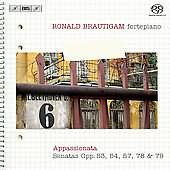Ronald Brautigam’s strong sense of style, superb technique, and commanding personality continue to make waves in his latest Beethoven cycle installment. The fortepianist joins Schnabel and Kempff among the few who’ve managed to effortlessly fuse simplicity and depth in the little Op. 79 sonata. The opening Presto is impetuous without sounding rushed, while the central Andante’s intensified dynamic contrasts underscore the main theme’s almost Schubertian sensibility. Although the finale goes at a more conservative trot than Beethoven’s Vivace implies, Brautigam’s eloquent phrasing still captures the movement’s playful “swing”.
Notice also how Brautigam’s ever-so-slight elongation of the Op. 78 Allegro vivace’s opening measures give no hint of the virtuosic surge up ahead nor of the fortepianist’s marvelously judged treatment of the zany major and minor key juxtapositions. Brautigam achieves tremendous sweep and excitement in the Appassionata’s outer movements without sacrificing anything in terms of articulation and contrapuntal detail. You might argue that he reads the central variations movement’s Andante con moto as an Allegretto, yet his unusually brisk pace allows a lot of flexibility.
Brautigam puts no less an individual stamp on the underrated Op. 54 sonata. His strict and unyielding treatment of the lyrical opening theme makes sense once you hear how it so easily dovetails into the loud, extended octave triplets that follow. The clarity of the second movement’s perpetual motion keyboard writing and syncopated accents justify Brautigam’s controversially breakneck tempo.
I haven’t mentioned the opening selection until now, because I’m saving the best for last. Brautigam’s “Waldstein” easily takes its place alongside this warhorse’s great recorded versions. It has everything–Schnabel’s brio and spiritual depth, Solomon’s unflappable digital acumen, Hungerford’s firmly etched articulation, and Arrau’s color–plus more. Drama and tension emerge not so much through speed alone as by way of Brautigam’s precisely timed modifications of the basic pulse, placement of accents, and ability to characterize contrasting themes without belaboring the obvious.
The singular timbral qualities of Brautigam’s instrument (a McNulty fortepiano based on an 1819 Conrad Graf model) enhance Brautigam’s interpretive revelations. For example, every note of the first movement’s low-register repeated chords registers clearly, rather than being obscured in the muddy haze we often hear on modern concert grands. The Rondo’s long pedal markings finally make sense as you hear the timbrally distinct upper and lower registers interact and sustain without blurring. I also suspect that the instrument’s lighter action accounts as much for the nimble passagework and astounding octave glissandos as does Brautigam’s practice routine. My original rating for this release was “wow!”, which translates into “10/10”. Don’t miss it. [10/14/2008]
































